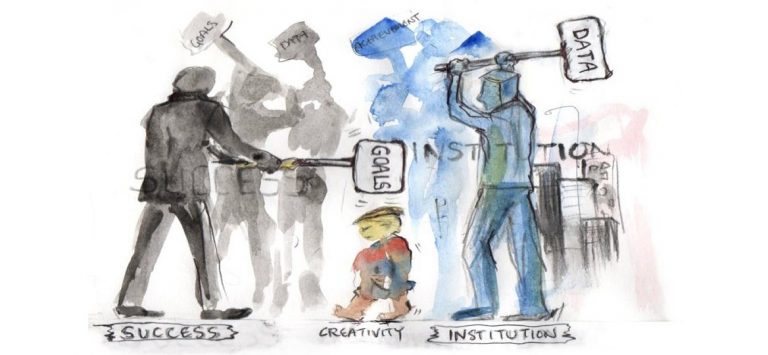Music and the arts should be a core part of the school curriculum, along with nurturing play and the sense of wonder and creativity which children so naturally possess
 Incessant testing and our unquenchable desire for outcomes data threaten the creativity, health and well-being of our children. Drawing by Ilona Brinton
Incessant testing and our unquenchable desire for outcomes data threaten the creativity, health and well-being of our children. Drawing by Ilona Brinton
Nearly every day I hear or read examples of how school children are suffering from the stress of pressurised schooling and high stakes testing, leading to mental health problems. Just recently I heard another personal account, a teenage daughter suffering panic attacks and near mental breakdown from the pressure and stress at school for top marks on A-levels, finally having to take a year out. Natasha Devon, former government mental health tsar, noted that exam pressure, the one thing government would have direct control of (and stipulates having), was a major factor in pupils’ mental health difficulties, yet she was ignored and ultimately fired. The government green paper on addressing mental problems in schools didn’t even mention exams…
Just as often, I hear about how beneficial music and the arts are for children’s health and well-being, even more so if the arts and activity are integrated into all subjects, such as demonstrated in the Turnaround Arts programme in the USA. In those schools (now totalling 84 and increasing) children were not only happier and with less behavioural problems but also – get this – through the integration of the arts improved their scores in maths and literacy! “We found a growing body of research to support positive educational outcomes associated with arts-rich schools…” their founding report notes. The children have the bonus of not only greater creativity in the arts but they are also more creative thinkers. Here’s a link: http://turnaroundarts.kennedy-center.org/
Yet school funding and curriculum cuts are consistently in the arts, as league tables and government assessment of school performance are based on primarily on literacy and numeracy test scores. Nevertheless OFSTED in the recent past has had the gall to turn around and tell teachers, they shouldn’t be emphasising learning for the test in their classes. Most teachers know that’s not the right approach, but they are forced into it by government policies on curriculum and funding based on test results.
Just recently there was an article entitled: ‘Myleene Klass: cuts to school music lessons are ‘a travesty – Musician and TV presenter says music should be valued in education as a core subject’. Here is the link: https://www.theguardian.com/education/2018/jun/09/myleene-klass-cuts-school-music-lessons-not-valued
Or another similar article: ‘Top musicians unite in call for all pupils to have the right to learn an instrument’, and the link: https://www.theguardian.com/education/2018/may/13/free-music-provision-every-child-primary-schools-bbc-young-musician-2018
A recent refreshing bit of news just recently was the announcement by Andria Zafirakou that she is using her $1million global teacher prize for setting up a charity for promoting artists and art in schools. ‘She said subjects such as art, music and drama were being squeezed out of the curriculum at a time when they had never been more important. “They’re not only essential for personal growth and self-understanding but they also teach young people to think creatively, learn to communicate effectively and build resilience…” See article: https://www.theguardian.com/education/2018/jun/26/1m-teaching-prize-winner-launches-uk-school-arts-charity
The government is basing their policies still on carrot-and-stick Victorian age thinking, based on economic industrial models (“Education is for the economy”, said Gordon Brown), not on the needs of children, and schools and teachers are largely forced to follow suit. It is upside down thinking. It is not how you inspire young minds to learn. And the children are suffering – it doesn’t take a specialist to observe that, just open ears and minds. Quite likely many of us have seen and heard it with our own kids. They are not an exception; there is not anything wrong with our children. It is the pressure we put them under, sometimes we as parents included. Urgent change is needed in teh educational system, if we value the future well-being of our children.
There are naturally many factors coming together in the huge rise in children’s and young people’s mental health problems that we are witnessing. Much attention has been given to social media, how the developers of these technologies know better and keep their children away from them until at least 14 years of age – then with the other hand try to sell them to as young children as possible! There is a lot of unethical activity in the commercialisation of childhood.
It also has to do with schooling in other aspects, for example what we do with our children in the early years.
In the early pre-school years – which in most countries apart from the UK and its ‘colonies’ would be up until age seven – they need to have plenty of play, and situations to nurture their natural creativity, curiosity and wonder for the world, full of goodness. Early schooling not only damages their natural physical development but it takes away the real interest and joy for learning, a number of studies showing these side-effects can last into adulthood. In other words, it’s very counterproductive. A long term study in the USA found that early schooling negatively affected health and well being for decades. See Sue Palmer’s book, Upstart. and the YouTube clip: https://www.youtube.com/watch?v=IMaxhELpG7I They are very informative, if needing to have concrete information and ‘evidence’ for showing others.
Then in the school years children need to have plenty of experiences that show them the beauty and goodness of the world around and which arouse their natural interest for learning. Subjects should be integrated with the arts and activities, nurturing the emotional life. This helps the child find and feel meaning in the world around and in their connection to it, which in turns enhances the meaning they find in their own lives. Emotional illiteracy, increasingly observed nowadays, is a by-product of the current soul-less educational systems, leading to an inner emptiness. This in turn increases the amount of depression, self-harming, and mental health disorders in young people.
A nurturing of some form of spirituality in the home life during this period, engendering a sense of wonder, has also been found to significantly increase children’s resilience into adulthood, giving them a greater sense for the meaning of life. This has been documented by Lisa Miller in her book The Spiritual Child. Home lives in our materialistic age are often devoid of such orientation. See her video https://www.youtube.com/watch?v=iU5KLzSQgbA .
If play and wonder have been nurtured in early years, and our connection with the world around has been nurtured through beauty, activities and the arts in the first school years, then our teenagers will not only have a greater resilience but will have greater inspiration to aspire with their new found independent inner life to the world of ideals and truth. Goodness, beauty, and truth. Three fundamental principles which have resounded through the ages.
Where do we start in the need for change?
The need for ‘spirituality’ in education and upbringing has been given some lip-service by even government officials, but in our materialistic culture one doesn’t know where to start or what it even means. Certainly it can’t be tested, so our score oriented school curricula ignores it. With the arts likewise: even though it has been shown in innumerable studies in schools that an emphasis on the arts even improves maths and literacy, as one can’t find the logistical, statistically measurable connection – the government is hooked on maintaining statistics on ‘achievements’ (ie in tests!) in schools on maths and literacy – the arts have persistently been relegated to low priority status.
Yet, as former President Obama stated in a gathering commemorating the Turnaround Arts achievements: “The arts are central to who we are as human beings, they are central to the success of our kids.”
What perhaps even Obama didn’t fully appreciate but which we come to more fully realise nowadays: the arts in education is a doorway to the soul for children and young people, into an inner world not of hatred and raw emotions but instead raising it to realise a world of beauty and joy. It lays a foundation in soul creativity which makes access to the inner spirit in adult life more readily accessible.
The problem is that we not only find it difficult to step out of very materialistic Victorian educational mindsets, but we also lack the creativity and courage to translate idealistic sounding statements into action. One particularly sees this with the politicians who set the policies for education.
The way forward comes back to each and every one of us as individuals: to nurture the creativity and the inner spiritual core which will help us find the courage to make this step, into action, in our lives, with our families, with our children, in the choices we make and promote. Our inner convictions, if we follow them in our day to day lives and activities, will have an effect, whether or not we write our politicians or engage in outer campaigns, which are also options.
As Gandhi stated, we have to be the change, with the courage to inner and outer action, even if others around don’t seem to be following suit. And, in fostering creativity and wonder, we will be nurturing greater health and well-being in our growing children, for their and our future.
Richard Brinton, June 2018
(an edited version of that originally published on LinkedIn)
The author is a regular contributor to the JUNO parenting magazine,
is co-author of ‘My Camino Walk 2,’
editor of the English edition of ‘Growing up Healthy in a World of Digital Media’
and is now working on a book
‘Finding the Magic: a Companion for Parents’.
